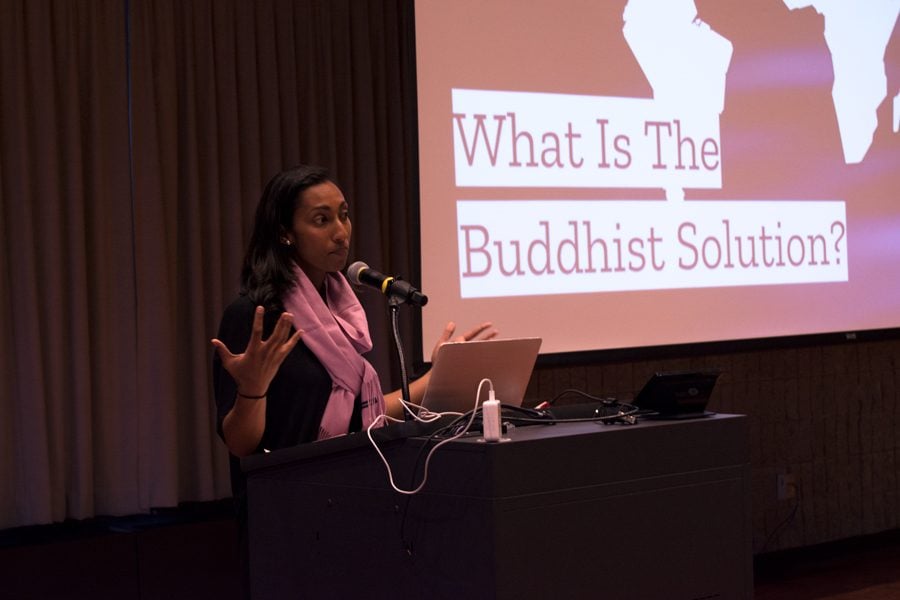Soka Gakkai International shares Buddhist teachings at Northwestern
Jennifer Zhan/The Daily Northwestern
Maya Gunaseharan of Soka Gakkai International speaks at Northwestern University. Gunaseharan shared how Buddhist teachings can help one find the inner strength to achieve happiness.
April 9, 2019
Students and community members gathered on Monday at Soka Gakkai International’s event to share their personal struggles, how they overcame them and how Buddhism gave them a key to happiness.
The event, “Buddhist Solutions for Real Life: When We Change, the World Changes,” provided practicing Buddhists the opportunity to connect with other Buddhists outside of their immediate communities and taught those unfamiliar with the religion to learn more about the core tenets of the religion.
Conrad Hirano, the president of SGI’s Northwestern Campus Club and a Weinberg graduate student, said Buddhism distinguishes between two types of happiness — relative and absolute — and the purpose of Buddhism is to achieve absolute happiness.
“Getting an A-plus on a test, a new car, or a new house — that kind of happiness is temporary and short-lived,” Hirano said. “But absolute happiness is that you have the conviction that no matter what, no matter what happens, I have everything to overcome. I feel undefeated. I feel fearless.”
Hirano said following this belief would help make Northwestern a better place for everyone and make sure that nobody feels lonely, powerless, or hopeless.
Maya Gunaseharan, a graduate student at the Soka University of America, said a 2018 survey from the University of California, Los Angeles claimed Generation Z is lonelier and in worse health than previous generations.
The crowd of 30, consisting mostly of people in Generation Z, shared the areas they struggled with most in their everyday lives. Their concerns fell in categories like family, health, finances, interpersonal and societal violence, discrimination and disunity among people.
The Buddhist solution, Gunaseharan said, is in the Lotus Sutra. The Sutra dictates that every person, without fail, has an incredible potential in them called “Buddha Nature,” and it is only a matter of whether one is able to access it.
One way to access one’s inner strength is through chanting the Nam-myoho-renge-kyo, a declaration to awaken the truth in Buddhism. Gunaseharan said her family always practiced Buddhism, but she only began chanting when she transferred to Cornell University as an undergraduate student. Chanting helped her overcome her sadness and loneliness and finally take control over her own life, Gunaseharan said.
Like Gunaseharan, Hirano said he was born into the practice but did not believe that he needed Buddhism in his life until he was 18.
“I used to compare myself to other people,” Hirano said. “I felt so empty, always.
“To me, the practice of chanting is also a process of having a dialogue with myself,” Hirano continued. “And people in SGI didn’t judge me for what I didn’t have.”
The Weinberg graduate student said Buddhism also had a concrete impact on his education and career choices.
Hirano recalled a moment when he felt that his career lacked direction. He was studying in Beijing, and when he questioned the purpose of a college education, his professor at Peking University told him “we study so that we can improve the lives of those who cannot afford a college education.”
His years abroad also forced him to experience the severity of air pollution firsthand, and his Buddhist practices motivated him to study air pollution and its solutions at a graduate level.
Members outside of the NU community traveled to campus just to attend the event. Justice Darrington, a member of SGI and a practicing Buddhist, said events like this are necessary for people to reflect on their days and talk through their mental health challenges.
“It all is a mentality game,” Darrington said. “At the end of the day, it’s really hard, but regardless of all the pain, it’s about finding the light at the end of the tunnel.”
Email: amyli2021@u.northwestern.edu
Related Stories:
– Buddhist study group seeks to calm stressful students through meditation



